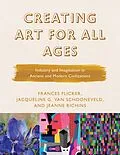This is the third book in the series Creating Art for All Ages. The series takes students on an interdisciplinary cross content journey. Each book provides experiences in language arts, social studies, math and art as the students investigate ancient and modern civilizations.
Industry and Imagination in Ancient and Modern Civilizations is the third book of the series and examines the generations of the Industrial Revolution, society during WWI and WWII, Modern and Contemporary times. During the era of the Industrial Revolution, the role of the artist transformed as the patronage changed and advancements in photography were able to portray likenesses. The artist sought new avenues by using art as an expressive tool. As time progressed, artistic expression navigated the art into innovative, imaginative and unique styles. Art became whatever the artist intended it to be.
Autorentext
Frances Flicker is a writer, artist, and teacher of art and humanities.
Jacqueline G. Van Schooneveld is a professor of teacher education.
Jeanne Richins is a lifelong educator and mixed-media artist.
Inhalt
Acknowledgements
Book Overview
Unit 1- The Industrial Revolution: The Beginning of the Modern Age
Chapter 1- Rococo, Neoclassicism, Romanticism, and Realism: Enlightened Visions and Differences
Lesson 1- Storytelling and Introduction: A Visit to the Prado
Lesson 2- Getting Good with Composition: Configured in Three Parts
Lesson 3- Seen from a Scene, an Allegorical Narrative Collage
Chapter 2- Finding Art in Science: Technology and Nature in the 19 th Century
Lesson 1- Storytelling: A Budding Imagination
Lesson 2- Brave New Balloons: Steampunk Design
Lesson 3- Biomimicry in Art: Designing from Nature
Lesson 4- Photography: Postcards from the Heart
Chapter 3- Impressionism: Bringing in the Light
Lesson 1- Storytelling: Monet's Japanese Bridge
Lesson 2- Inspired by Nature: Monet's Bridge in Mixed-Media
Lesson 3- Cultural Links: Making Japanese Lanterns with an Impressionistic Flair
Lesson 4- Dancing Degas: Creating a Pastel Painting with a Close-up View of Nature
Unit 2- The World at Conflict: Art Responds
Chapter 4- Pointillism and Post-Impressionism: Defining Shape Differently
Lesson 1- Storytelling: Paintings to Posters, An Art of the Industrial Age
Lesson 2- Getting the Point with Pointillism: Making a Pointillist Painting
Lesson 3- Vincent Van Gogh, Post-Impressionism: A Variation on Starry Night
Lesson 4- Setting the Table with Cezanne: Creating a Diorama
Chapter 5- Fauvism, Cubism and Expressionism: A Voice of Art
Lesson 1- Storytelling: Guernica! Yelled Picasso
Lesson 2- Fauvism: The Wild Side of Shape and Color
Lesson 3- Cubism: Putting Together the Pieces, Making a Cubist Still Life
Lesson 4- Expressionism
Chapter 6- Surrealism and Abstract-Expressionism: Get Real!
Lesson 1- Storytelling: Art is a Symphony in Colors, Lines and Shapes
Lesson 2- Abstract-Expressionism: Feeling with Colors, Lines, Shapes and Textures
Lesson 3- Dada Makes No Sense: Making a Dada Image
Lesson 4- Beyond Reality: Making Surrealistic Artwork
Lesson 5- Abstract-Expressionism: What's Art Got to Do with It Anyway?
Unit 3- What is Art? Art Makes Us Human
Chapter 7- Cartoon Characters and POP Goes the Art
Lesson 1- Storytelling: What Makes Art Go POP?
Lesson 2- Making a Pop Art Combined Painting Collage
Lesson 3- Say it with a Cartoon: Crafting a Cartoon Name
Chapter 8- Post WWII through Contemporary Era: Constructing Environments
Lesson 1- Storytelling: A Special Place
Lesson 2- Envision a Building of your own Design: Activity on Two-Point Perspective
Lesson 3- Color Field Paintings: An Intuitive Art
Lesson 4- Shadow Box Design
Chapter 9- Art is Everywhere
Lesson 1- Storytelling: A...
